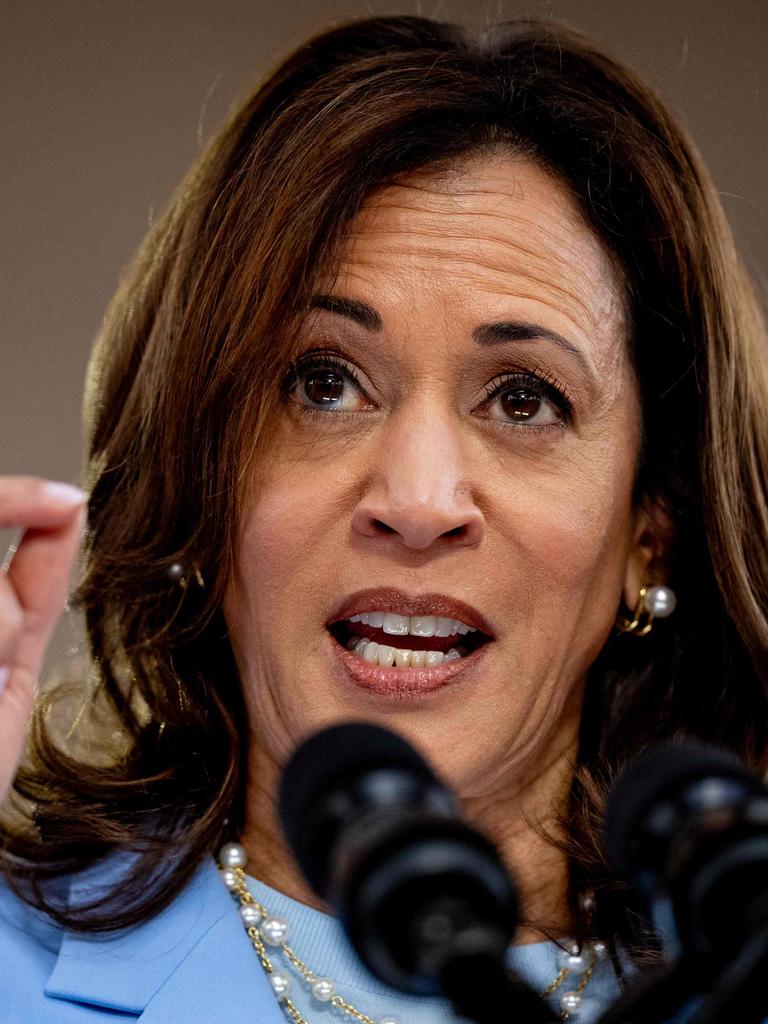Donald Trump assassination attempt triggers bizarre theory
The attempted assassination of Donald Trump has triggered a truly bizarre theory – and it could hand him the keys to the White House.

The Chosen One. A new “King Cyrus”. The fulfilment of prophecy. America’s evangelicals are going full throttle after presidential aspirant Donald Trump survived his assassination attempt.
“Right-wing Christianity is presently experiencing mass radicalisation around Trump,” warns US religion scholar Matthew Taylor.
“Trump has captured the imaginations of the non-denominational charismatics and prophecy believers like no American politician before him.”
It’s a tried and true tactic.
Trump rode a tide of organised fundamentalist, revivalist and Pentecostal support to his 2016 presidential victory. They painted him as a “Defender of the Faith” destined to hand control of the “Seven Mountains” of society – education, media, family, government, business and faith – to his followers.

And while not a churchgoer himself, Trump sought to maintain the image by surrounding himself with controversial proselytisers during the early days of his presidency.
Now, despite 34 convictions and ongoing criminal charges, he’s won the support of Christian nationalist groups once again.
“No one will be touching the cross of Christ under the Trump administration, I swear to you,” Trump pledged earlier this year at a Christian media convention in Nashville.
Purveyors of prophecy
It’s no longer about reinterpreting the words in the Bible’s prophetic books – such as the New Testament’s Book of Revelation and the Old Testament’s Ezekial and Daniel.
It’s about a new age of supernatural vision.
“This insurgent new faction of evangelicals believes in modern prophecy, that there are literal prophets today who speak the words of God directly,” Taylor, a senior researcher at the Institute for Islamic, Christian and Jewish Studies, states.
My latest piece is in @politico
— Matthew D. Taylor (@TaylorMatthewD) July 21, 2024
concerning how the 100s of Christian Trump pophets are excitedly interpreting the assassination attempt.
If you think that sounds absurd, please read, bc these prophecies helped foment January 6th & could do so again.https://t.co/efNDpvquqG
“Within minutes of the shooting hitting the news, a constellation of prophet-influencers took to social media to claim that they had predicted this incident.”
Popular prophets leapt onto Instagram, Twitter (now X), and YouTube to explain how they knew the attack would take place.
Most were sketchy. Some didn’t match.
One, however, turned its obscure preacher into an overnight sensation.
Brandon Biggs posted a sermon in March stating: “This bullet came by [Trump’s] ear, and it came so close to his head that it busted his eardrum and he fell to his knees … and he started worshipping the Lord”.
It wasn’t just the social media influencers who jumped on the bandwagon.
Pastors at megachurches across the United States credited God with saving the former president in their Sunday sermons.
“My question is, why is Donald Trump alive?” Pastor Jack Hibbs said to his California congregation.
“It wasn’t the man. It was the decision he made regarding the blessing of Israel.”
Holy hindsight
Influencer Jack Posobiec, who believes democracy is getting in the way of a Christian state, quickly opened his Bible to the book of Ephesians.
“The bullets were fired at 6:11pm,” he states.
“Ephesians 6:11 says, ‘Put on the whole armour of God, that you may be able to stand against the schemes of the devil’.”

But Ephesians is the 10th book of the New Testament. Or the 48th book of the Bible, if you count the Old Testament.
And Posobiec didn’t account for those numbers in his application of metaphysical numerology.
There are a lot of verses classified as 6:11.
Genesis 6:11, for example, states: “Now the earth was corrupt in God’s sight and was full of violence”.
And Revelations: “Then they were each given a white robe and told to rest a little longer, until the number of their fellow servants and their brothers should be complete, who were to be killed as they themselves had been.”
Biblical scholars warn that Christian extremists are skilled at plucking out words of scripture, distorting their context and reshaping them to suit an immediate agenda.
And this can help promote conspiracy theories, justify violence or dignify intolerance.
When Mark 12:17 (“Then Jesus said to them, ‘Give back to Caesar what is Caesar’s and to God what is God’s’”) proves inconvenient, another line can always be found.
Such as Matthew 10:34 (“Do not think that I have come to bring peace to the earth. I have not come to bring peace, but a sword”).
Both, however, are parts of a larger discourse. But you have to actually read the full text to discover what.
Past as present
Trump has bypassed one traditional notion that Christianity is about good people doing good deeds, charity and “turning the other cheek”.
Part of this was through his early association by leading evangelicals with the accidental saviour of the Jewish nation, the heathen Persian King Cyrus the Great.
Cyrus overthrew the neo-Babylonian Empire in 539BC. One of his most significant acts was to reverse the previous Babylonian policy of forced migration of populations out of the territories it had conquered. One of these groups was the captives of Judah, forcibly deported after the siege of Jerusalem by Nebuchadnezzar II.
Trump’s supporters interpreted this as meaning their god could choose anyone he wanted – even a heathen king – to channel his work.
“Trump would be a sort of secular saviour, a heathen warrior king who would deliver conservative Christians from their purported cultural exile,” writes Taylor.
According to some, Trump is also King David (the adulterer anointed by god).
Samson, the Defender of the Faith (and sex addict who died in prison but also did god’s work).

And Jesus, the long-suffering saviour, and son of god.
“If anything, the various prophecies and apocalyptic visions of the vindication of Trump have grown in fervour and ferocity since January 6 (2021), and they are likely to do so further in the wake of the assassination attempt,” says Taylor.
“For many Christians, Trump is the improbable but divinely ordained hope for reChristianising America.”
Of ‘demon-crats’ and democracy
“The more that MAGA Christians embellish Trump with Messianic properties and make him an instrument of divine wrath on God’s enemies, the more of a menace they and he pose to democracy,” Taylor writes.
“If Trump wins, he might claim — to shouts of acclamation from his devotees — a divine mandate to remake America.
“If he loses, these prophecies may once again become rationalisations for attacking the ‘demonic’ institutions that dare defy God’s anointed.”
Presidential candidate Kamala Harris is already being linked to the “antichrist” – like Joe Biden, Barack Obama, Bill Clinton and Ronald Reagan before her.
She’s also a “Jezebel”, the biblical epitome of a wanton, wicked, manipulative woman before she was thrown out a window and fed to the dogs.
It’s imagery that holds particular significance for large parts of the US electorate.
About 80 per cent of those who identify as white evangelical Christians voted for Trump in his failed 2020 bid for the presidency. That was a similar percentage to his successful 2016 campaign.
Analysts and pollsters say this is likely to remain the same in 2024.
Christian scholar Karen Swallow told US media that this year’s presidential race rhetoric sounds familiar, but “intensified”.
“Now his supporters believe themselves,” she said.
“Despite the fact that Trump clearly wavers on abortion and he wavers on LGBTQ issues, those things are just ignored. They’re just erased out of the narrative.”
But Trump isn’t supposed to be perfect, his preachers proclaim.
Just good enough.
“Voters aren’t supposed to elect messiahs,” says Taylor.
“We’re supposed to elect chief executives and commanders in chief, whose job it is to do the will of the people.
“Prophecies, divine anointings and heavenly missions are garments fit for bedecking dictators, authoritarians and cult leaders, not the humble robes of democratic servants of the people.”


Exploiting the anti-Christ
“In the history of the West over the last 2000 years, there has never been a time when someone hasn’t been predicting the end of the world,” says University of Queensland religious thought scholar Emeritus Professor Philip Almond.
In the Christian world, he says that means the antichrist is mentioned in three New Testament passages in the letters of John.
“Vast amounts of Christian ink have been used to try and work out when he will come and just how we might identify him when he does,” Professor Almond writes in The Conversation.
Over the first several centuries of the Christian tradition, the scholars of the early Church started to pore over an array of other Biblical characters, finding references to the antichrist within them: the “abomination of desolation” in the books of Daniel and Matthew, “the man of lawlessness” and “the son of perdition” in a letter of Paul. The book of Revelation describes a singular figure as “the beast from the earth” and “the beast from the sea”, whose number is 666”.
These early church scholars interpreted this as meaning:
He is the “son of Satan” – the moral and spiritual opposite of Jesus Christ.
He is a tyrant – a world leader. Originally, he was supposed to be a messiah and king of the Jews in Jerusalem who would persecute Christians for seven years before an apocalyptic final battle.
He is a trickster – a “false prophet” who can readily deceive the masses to his true intentions and acts.
He is one and many – as 1 John says in 2:18-23, “Children, it is the last hour, and as you have heard that antichrist is coming, so now many antichrists have come”.
“The core idea of the Antichrist — of evil at the depths of things — lays upon all of us the ethical imperative to take evil seriously,” writes Professor Almond.
“Whether the end is nigh or not, we should work to minimise harm and maximise the good in the here and now.”
Jamie Seidel is a freelance writer | @JamieSeidel






